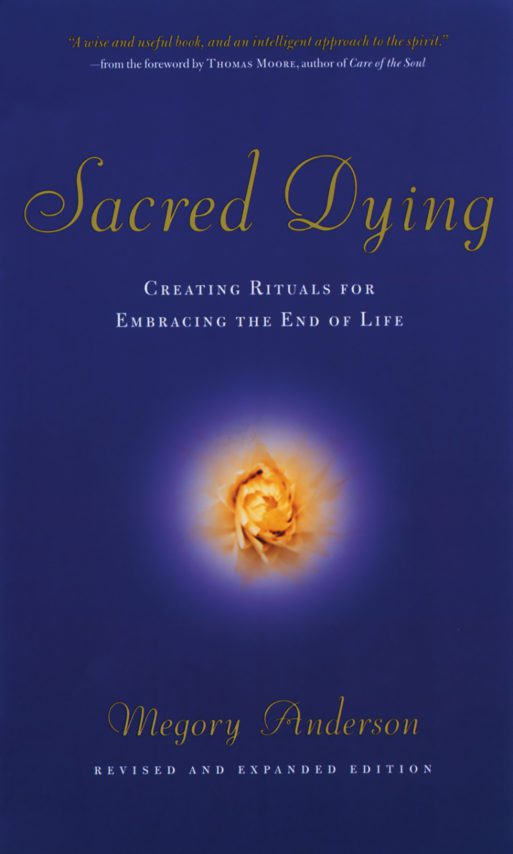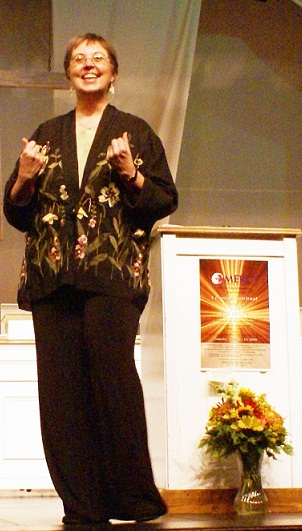 Megory Anderson’s book Sacred Dying is a happy blend of a spiritual, emotional and practical guide to preparing for our final journey: dying.
Megory Anderson’s book Sacred Dying is a happy blend of a spiritual, emotional and practical guide to preparing for our final journey: dying.
What does it mean to die “sacredly”? Anderson’s book highlights a variety of rituals we can employ for those who are dying, but it is in no way centric to any religious creed. Sacred Dying aims to remind us of our longstanding human tradition of creating personalized end of life rituals — a tradition that has become quite a hush-hush topic since World War II.
One of the most enlightening aspects of Sacred Dying is its understanding of the social history behind death and dying. Anderson’s knowledge speaks not only of where we have been on the topic, but of where we need to go to improve our end of life preparations today. “In the Middle Ages death was always a public event,” explains Anderson, “the entire community gathered at the deathbed.” Afterwards, she says, we reach the Victorian era’s notion of the “noble griever,” in which those surviving the loved one demonstrate “devotion and piety” in their mourning. And it was World War II that really steered our focus away from extensive engagements with the dying process. Though the battles were finished and the Germans defeated, a new enemy emerged in the minds of Americans: Death. The word and its connotations, now so associated with wartime violence, were the complete inverse of the 1950s Americana spirit. Thus, the dying process “became not only something fearful but also something invisible.”
Thus, we arrive in our present culture of death denial – something Anderson recognizes and systematically assuages in a book that she says is meant to be a “testimonial and a handbook.” As both an Episcopalian and a theologian, Anderson is well-informed on the helpful passages and last rites pertinent to Anglican beliefs; it’s one of the reasons why she found herself, incidentally, holding vigils for those on their death beds. But Anderson’s passion for cultivating a space for a good death transcends any one religion, and her book looks to endless ways in which we can make this a reality.
What does it mean to hold vigil for someone on his or her deathbed? And what is it about a dying process that renders it “sacred?” Anderson’s first vigil occurred somewhat on accident, when her friend’s brother was on his deathbed, waiting for his last rites. But a priest was nowhere to be found.
“…what is it about a dying process that renders it “sacred?””
Anderson’s friend called her, asking if she could give a few words of comfort, or prayer – anything – to help her brother through his final moments with grace and dignity. Together, the author and her friend created a calm space for a man afraid of “whatever comes next.” They lit candles and found music to soothe the soul. They “couldn’t celebrate the Eucharist without a priest,” but broke bread in unison regardless. Finally, they bathed the dying man. He passed on so peacefully that Anderson soon began receiving calls from friends to “hold vigil” again – and it didn’t take long for the author to see, as she says, that she was about to embark on a life’s work.
Many of the aspects of Anderson’s first vigil have found their way into her more secular vigils: one doesn’t have to be baptized to be bathed, nor does one have to be religious to find comfort in sharing a simple meal. “The priority is that people moving on to active dying need spiritual presence — somebody there to facilitate that experience. Most people die alone or with family who don’t really know what to do,” explained Megory in a 2013 interview with SevenPonds.
This, we learn, is what sacredness is about: having a positive space for the dying process. It means having the opportunity to talk with someone about your hopes and your regrets – whatever you need to find peace of mind. And Sacred Dying is a gem of a book in that respect. It knows that, with the aid of those you care about, we all have this capacity to create a sacred atmosphere for a precious, final step in our life cycle.
Related:
- SevenPonds’ interview with Megory Anderson
- Visit Anderson’s website and learn about the Sacred Dying Foundation
- SevenPonds’ post on the top 5 regrets of the dying

 “Sacred Dying” by Megory Anderson
“Sacred Dying” by Megory Anderson



 Recovering Cremation Remains After the Los Angeles Fires
Recovering Cremation Remains After the Los Angeles Fires
 “As Tears Go By” by Marianne Faithfull
“As Tears Go By” by Marianne Faithfull
















